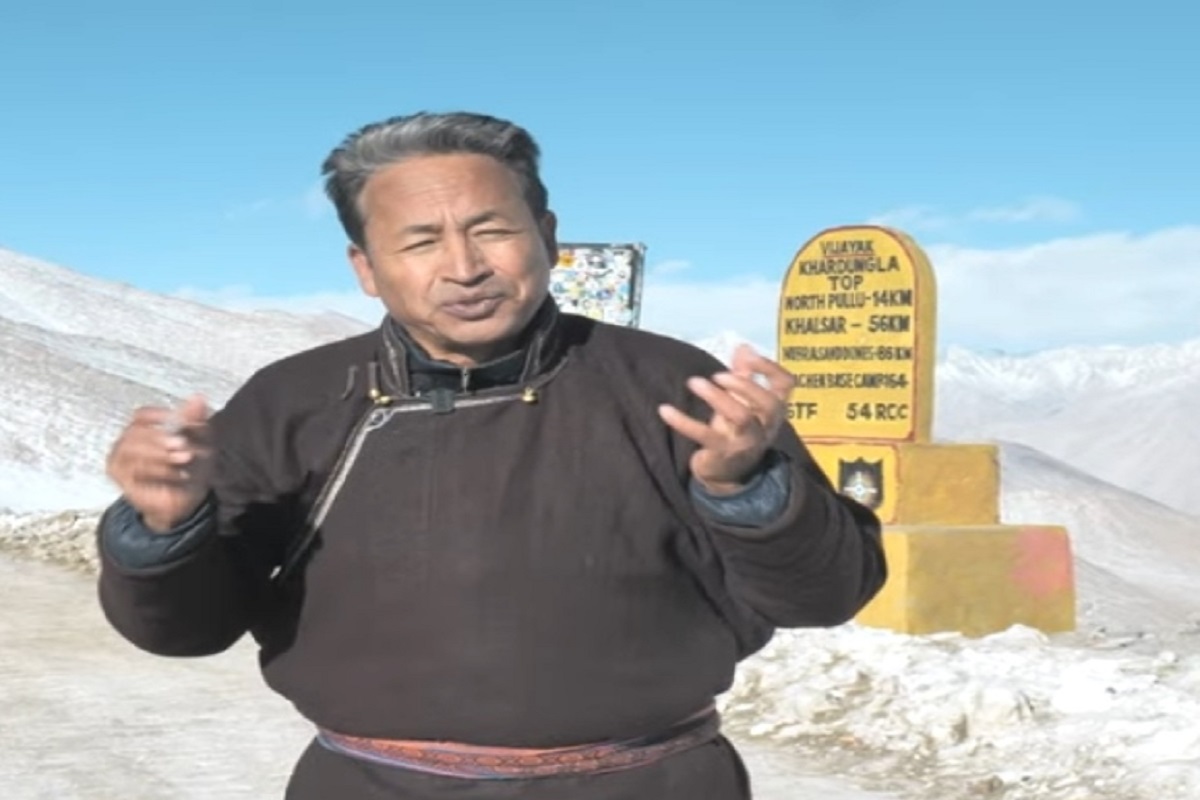The Hindu Kush Himalayan region, encompassing Bhutan, Nepal and long border stretches of India, China, Pakistan and other nations, is often referred to as the “Third Pole” because it holds the largest reserve of snow and ice outside the polar regions. This region is crucial to the livelihoods and economies of billions of people, as it is the source of ten of the largest rivers in Asia. However, climate change is threatening this lifeline, with glaciers retreating, and weather patterns becoming increasingly unpredictable. Scientists have declared that the Hindu Kush Bio-Sphere is on the brink of collapse.
In this critical situation, Ladakh’s proactive approach towards climate change becomes a source of inspiration. Ladakh is an Indian Union Territory with the highest high-altitude plateau that is mostly desert. Despite its stark landscape, Ladakh is a place where the principles of ‘dharma’ – a concept encompassing duty, righteousness, and moral order – take precedence over material gain. The quarter-million people of Ladakh have an intrinsic understanding that true wealth lies in the health of their environment and the continuation of their cultural heritage, not just in immediate financial benefits. Over the years, Ladakh’s response to climate change has been multi-faceted: from innovative water conservation measures to investment in renewable energy, protection of biodiversity, promotion of sustainable agriculture, focus on climate education, and integration of sustainability into governance.
Advertisement
These initiatives have fostered a resilient community, capable of adapting traditional wisdom to contemporary challenges. Such strategies are underpinned by an ethos that values sacrifice and stewardship, viewing the preservation of the ecosystem as a sacred duty rather than an economic trade-off. Their commitment is exemplified in the pioneering work of the educational institution, SECMOL (Students’ Educational and Cultural Movement of Ladakh). This movement seeks to engage local communities in sustainable practices by empowering young Ladakhis, providing education that harmonizes with the region’s environmental and cultural ethos. This model of local involvement, alongside water conservation through ingenious methods like ‘ice stupas,’ solar passive mud buildings, widespread use of solar power for water heaters, responsible tourism, and traditional compost toilets, encapsulates a comprehensive approach to climate resilience. The whole Hindu Kush Himalayan region stands to gain from these community-based strategies, fostering a sense of ownership among residents to preserve their unique environment.
A poignant embodiment of their commitment is the ongoing ‘Climate Fast’ undertaken by the people of Ladakh, fasting in chilling Himalayan temperatures to spotlight the urgency of climate action. Led by global innovator, educator and engineer Sonam Wangchuk, their fasting is a profound expression of dharma toward the Earth and future generations. It underscores a collective vision for the future – one where the integrity of our ecosystems is regarded as sacred and indispensable. Fasting is self-degrowth; a sacrifice that seeks to inspire self-reflection for many that our present course is not sustainable. This steadfast vision and dedicated action come with huge sacrifices. Ladakhis have forgone certain development opportunities that conflict with their ecological and cultural values. Instead, through their daily lives, they demonstrate how to carve out a development path that is sustainable, one that respects the fragile balance of their high-altitude ecosystem. In Ladakh, this is not a new-fangled trend but a time-honoured tradition. By prioritizing their dharma over short-term economic gain, they have maintained the purity of their rivers, the sanctity of their mountains, and the vibrancy of their culture. The fast in the freezing cold is a dramatic assertion that the people of Ladakh are ready to bear hardships for the greater good. It is a clarion call for humanity to adopt a similar ethos of selflessness and sacrifice by choosing to live simply.
Such acts of conviction and courage galvanize communities and inspire policymakers to reflect on the long-term implications of their decisions. The message emanating from Ladakh’s austere landscapes is clear: the well-being of our environment is non-negotiable. It carries a stark warning: while economic development can be postponed, the irreversible loss of glaciers – a critical source of water and life – cannot. Hence, it is not just a call to action but a plea for introspection about the kind of progress we pursue and the legacy we wish to leave for future generations. In the face of climate change, every region, every community, and every individual has a role to play, a dharma (personal mission) to fulfil. As the Hindu Kush Himalayas look toward Ladakh, they see not just strategies and initiatives but a spirit of unwavering commitment to the planet – a spirit that must be kindled across the globe.
This spirit promises a future where economic systems are redesigned to serve not only humanity but all life forms. It envisions a world where development is measured not by the yardstick of profit but by the well-being of the environment and the resilience of communities. Ladakh shows an alternative path to healthy well-being and peace with our planet. Simply put, Ladakh’s ‘Climate Fast’ and the teachings it embodies are seminal to charting a course for the Hindu Kush Himalayas and beyond. The dharma of environmental stewardship, as embraced by the Ladakhis, is a testament to the profound wisdom that when we protect our earth, we protect ourselves. In the stillness of Ladakh’s cold, the warmth of this understanding beckons us to a future where economy and ecology walk hand in hand, guided by the immutable principles of dharma.
(The writers are, respectively, Distinguished Fellow of Asia Global Institute, University of Hong Kong, and a Research Fellow at Georgetown Institute of Open and Advanced Studies)











